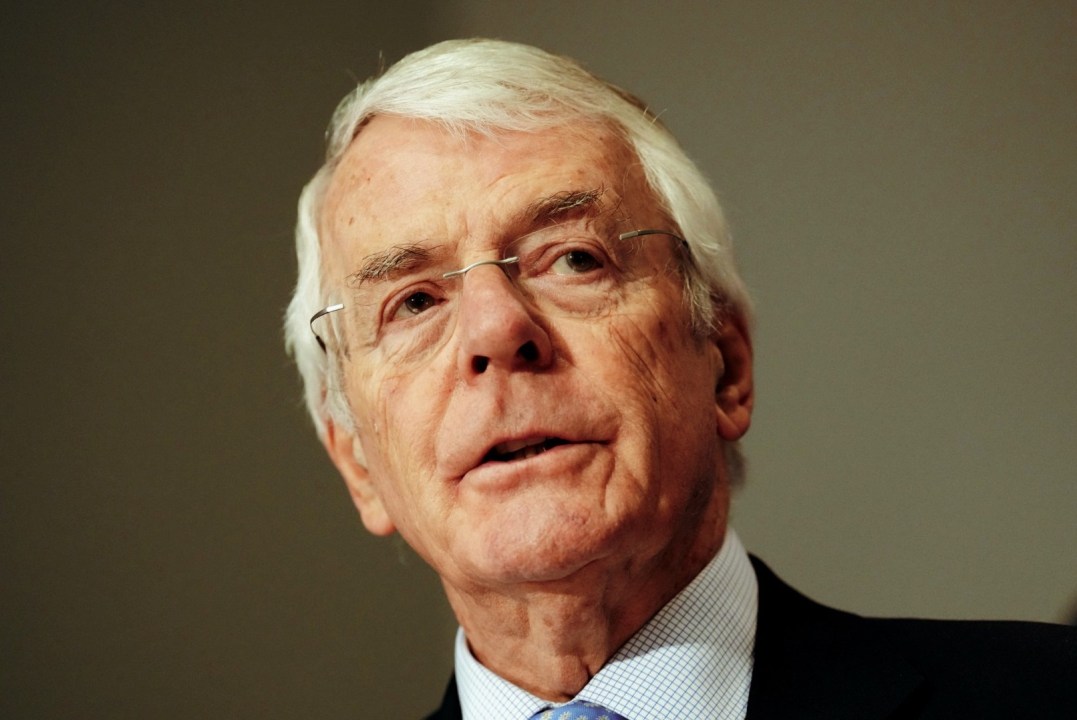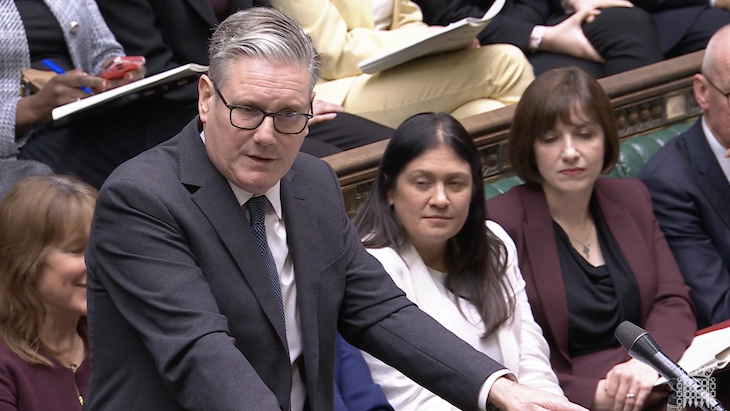They were John Major’s kind of people, the audience in the Sheikh Zayed Theatre in the Cheng Kin Ku Building at the London School of Economics last night. They filed in quietly, took their seats politely, and waited relaxedly for the ex prime minister. One man slouched, careless blotches of black dye on his thinning cirrus hair, while another sterilised his glasses with an individually wrapped wipe, going in every corner and crevice until it all looked stupidly clean. A third flicked through the Financial Times. It was 6:25 p.m., five minutes before Sir John was due. Only a man with no worries takes the morning’s news in the evening.
Sir John would say the audience was ‘at ease with itself’, and that is exactly how he likes his people. If Sir John has wanted one thing for Britain in his political life, it is for the country to be ‘at ease with itself’. He said so first on 28 November 1990 outside Downing Street after he’d accepted the Queen’s invitation to form a government, and he has repeated the mantra many times since. Just last year he said it, when the BBC’s Amol Rajan asked what he would like to achieve in his remaining years: ‘I would like to live long enough to see my country at ease with itself.’
Sir John, then, thinks we’ve been in a discontented state for at least the last 35 years. But it’s a matter of perspective. Maybe it’s he who is just permanently uncomfortable with his country. Of the living ex prime ministers, he is the least settled. Rishi Sunak is a columnist, Liz Truss is a Maga blowhard, Boris Johnson is a family man and Theresa May is a respected parliamentarian. David Cameron is a lord and consultant. Gordon Brown is a UN envoy. Tony Blair is the most content of them all, playing the role of his life in a satire of a New World Order cultist. Each of our old leaders has found their place in the global ecosystem.
Each apart from Sir John. He is left making the odd intervention to those who will still listen. Yesterday, that was four journalists and a small lecture hall of students, associates, randoms, his chief-of-staff and security guards along with the family and friends of Professor Maurice Fraser, whose annual memorial lecture he was to give. The subject of the speech, as it always is at these things, was ‘Britain in a changing world’. To applause Sir John came to the lectern and began: ‘Our world today is not the happiest place. It’s unsettled, grumpy, fractious, changing in character as economic hardship bites, populism increases – I will return to that later – and America and her allies begin to grow apart…’
The next 40 minutes was an exhausting tour of the world through banalities and proverbs: Ukraine (‘The invasion of Ukraine had no credible or justifiable cause’); China (‘A strong opponent of liberal democracy’); America (‘A friendship broken can be very hard to regain’); and Europe (‘Brexit was a flop. It will not leap up from its deathbed’). He said our politicians are not meeting the moment.
It was all delivered in that tone of restrained anger you’ll know from the ‘put up or shut up’ speech Sir John gave in the No. 10 garden in 1995, that voice where he’s warning you he could properly kick off in a second. Sort of similar to Ed Miliband’s ‘Hell yes I’m tuss enuss’. The sad thing is that Sir John can be charming, but only when caught unaware. Watch the ITN interview with Michael Brunson from 23 July 1993, the day he won the Maastricht confidence vote, when he thought he was off camera. He joys in how he was underestimated, and even allows himself a little smile. ‘I don’t understand why such a complete wimp like me keeps winning everything!’
Sir John has always been underestimated by Britain, and he has always overestimated others. That is the relationship between this man and his country. In his memoirs, published in 1999, Sir John is frequently disappointed by expecting too much of people. In the opening pages, he remembers being called LBW incorrectly by an umpire in a game of cricket at school: ‘‘‘You’re out,” he said, waving his hand in dismissal. “Now off you go.” It was the first time I realised that adults were fallible and that, if on shaky ground, they could become even more assertive than if they were right.’ Later in the book, Sir John says that newspaper columnists who attacked him after Black Wednesday ‘should have known better’. They fed propaganda to an ‘unthinking’ England.
Logic is all Sir John has ever demanded of Britain
Sir John seems to enjoy telling people how wrong they are. In the Q&A after his lecture, he was reminded by the chair Professor Simon Glendinning of his speech at the Conservative party conference in 1992, and of the lady from Cornwall he had invoked. ‘During the summer when I was in Cornwall,’ Sir John told his Conservative colleagues in that address in Brighton, ‘a lady came up to speak to me. “Mr Major” she said, “please, please don’t let Britain’s identity be lost in Europe”. She didn’t tell me her name. But she spoke for the anxieties of millions. She spoke for this country. She spoke for me.’ What, Professor Glendinning asked, would Sir John say to the lady from Cornwall today?
‘I wish she were here,’ he replied. ‘I wish she were here because I wonder whether she is one of the many people who, seeing what it is like outside Europe, has changed her mind about whether we should be in or out.’ His brain in that moment seemed to flicker back to the early Nineties, like a trauma victim getting a flashback. ‘My reason for being at the heart of Europe was not to sink and throw away our sovereignty! And anyway, we didn’t throw it away!’ He loudly despaired: ‘There was no logic in this belief.’
Logic is all Sir John has ever demanded of Britain. He wishes politics wasn’t made up of emotion and ideology and opinion. He prizes the knitting-up of conciliation. Why can’t humans just not be like they are?








Comments